Partial Dentures
What to know about partial dentures and services offered by Richmond Denture Clinic
Partial dentures are a dental instrument that can make your smile complete again by replacing one or more missing teeth. Richmond Denture Clinic offers specific information regarding materials and uses and quality services that can make your life and your smile better.
What are Partial Dentures?
Partial dentures are prostheses for missing teeth. In contrast with full dentures, they only replace one or more missing teeth instead of a full set. These stay in place by attaching them to a set of healthy teeth using clasps. The clasps are either plastic or metal. If you still have healthy teeth, partial dentures are an excellent option.
There are two different types: fixed and removable. The main difference between them is the ability to take the removable partial denture on and off if you wish. Under these two types, there are other different kinds based on their material, and each has different uses that favour one situation over another.
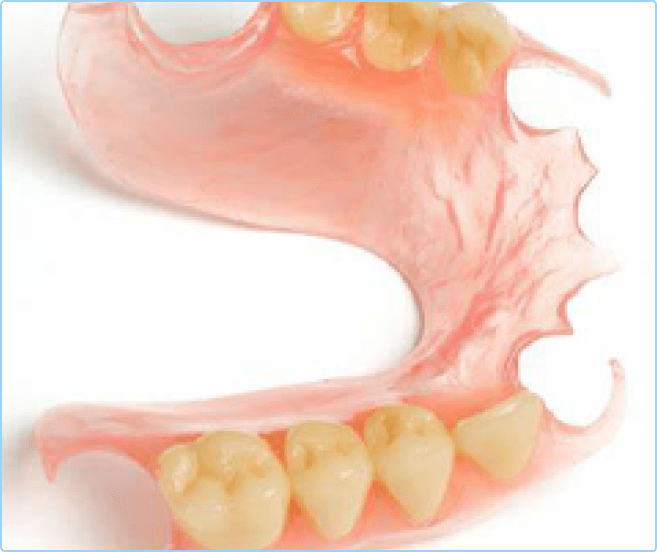
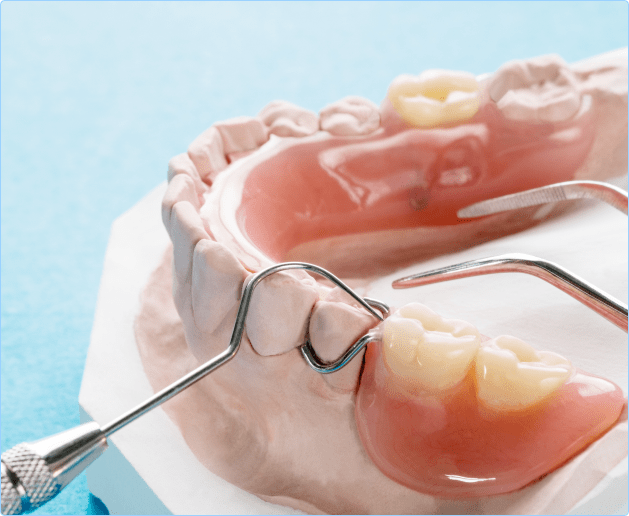
What Types Of Partial Dentures Can You Use?
There are two different types you can choose from: fixed and removable. There are different types of partial dentures under these two. Under removable partial dentures, we have metal, acrylic, and flexible; under fixed, we have traditional, cantilever, Maryland, and implant-supported bridges.
Each of these differs in function and material. The denturist will give you different options according to your situation and preferences. Some are more comfortable, while others are more durable. Some are considered temporary, while some are short or long-term solutions. Metal ones are usually more durable and lighter than plastic ones, explaining the more expensive price tag.
01: Removable Partial Dentures
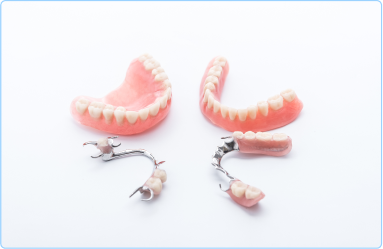
Metal Partial Denture
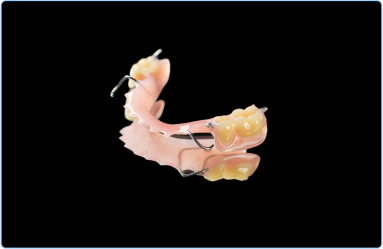
Acrylic Partial Denture
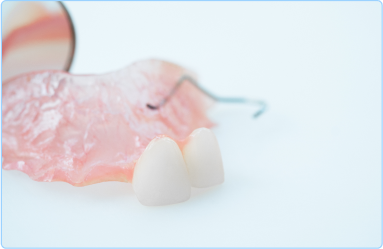
Flexible Partial Denture
02:Fixed Partial Dentures
Traditional Bridge
The traditional bridge is the most common type out of the four. It contains two or more crowns and one or more filler teeth connected. A traditional bridge is made from metal, porcelain fused to metal or ceramics.
Cantilever Bridge
The cantilever bridge is similar to the traditional bridge. The only difference between the two is that this bridge type only supports the tooth from one side. A cantilever is a term for a structure only anchored at one of its sides.
Maryland Bridge
The Maryland Bridge is made of porcelain or gold. This type is commonly used to replace missing front teeth, but it can cause damage to existing teeth. This option is also not as sturdy as the other options. The bridge has two structures similar to wings bonded to the adjacent teeth, keeping the bridge stable.
Implant-Supported Bridge
This type of bridge is supported by a dental implant. Implant-Supported Bridges are usually used to replace three or more missing back teeth. These are significantly more durable and stable. It recreates the teeth' aesthetic and function more than the other types in certain cases.

When is the Right Time to Get Partial Dentures
If you have lost teeth or are on the verge of losing teeth due to gum disease or age, partial dentures might be right for you. Healthy teeth won’t need an extraction, which means you’ll only need a prosthesis for the few teeth that you don’t have. Partial dentures are also suggested for patients who are not candidates for dental implants and/or if an easy removal of the replacement teeth is essential. You should consider these if cost is your primary concern since these are less expensive than full ones. If you don’t want surgery, this is a good option.
What to Consider When Planning on Getting Partial Dentures?
Location in Your Mouth
Each type of denture has its own function. Most of the time, the location dictates the type of partial dentures you get. Front teeth will be used primarily for aesthetics, while the back teeth are used for eating. Some types are also better suited for one location than another. For example, Maryland bridges are usually for front teeth, while implant-supported bridges are more often than not for back teeth.
Number of Teeth On the Dentures
Some types are better suited for a particular scenario, depending on the number of adjacent teeth that need to be replaced. You have to decide between single tooth dentures or bridges if you’re missing only a tooth. Implant-supported and traditional bridges are more suitable for multiple teeth, while Maryland bridges are better for single teeth.
FAQs About Partial Dentures
These are the commonly asked questions about partial dentures that you may have. If you have any more questions, please do not hesitate to contact us.
What does the price of partial dentures depend on?
How natural are the appearance of partial dentures?
How do partial dentures clip to the mouth?
When should I go back for a check-up?
Blog / News
Latest Updates

Our COVID-19 Update
The health and safety of both our patients and staff have always been our top priority. We have always used enhanced levels of sterilization and utilized PPE that followed the College of Dental Surgeons of BC’s
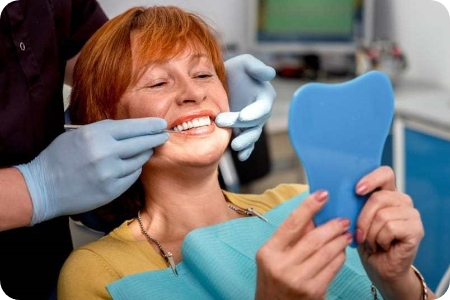
Discussing Dentures: Investing In Your Smile To Improve Overall Health
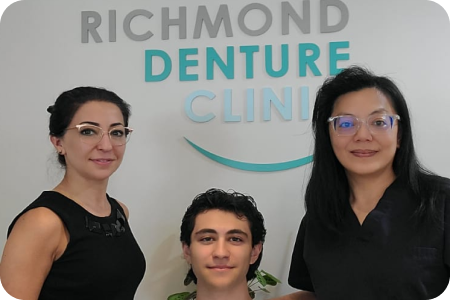
Richmond Denturist Brightens Up Community One Smile At A Time
For Sonia Raeisi, helping people feel confident and comfortable with their smile is no easy feat. Though, it’s one she’s been doing for the past decade. With a tagline like ‘where quality means comfort and
Have a question or inquiry? We have answers. Leave Richmond Denture Clinic a message!
If you have any questions or inquiries, do not hesitate to leave us a message. We will get back to you shortly and answer all your questions. Here at Richmond Denture Clinic, we understand your denture needs are important. That is why we have a registered denturist and dental laboratory assistant always ready to answer your questions and explain your options for you.
-
 Unit 113 – 7000 St. Albans Road, Richmond, B.C. V6Y 2K1
Unit 113 – 7000 St. Albans Road, Richmond, B.C. V6Y 2K1
-
 [email protected]
[email protected]
-
 Call (604) 273-4221
Call (604) 273-4221
-
 Weekday 9 AM – 5PM, Saturday-Sunday: CLOSED
Weekday 9 AM – 5PM, Saturday-Sunday: CLOSED
